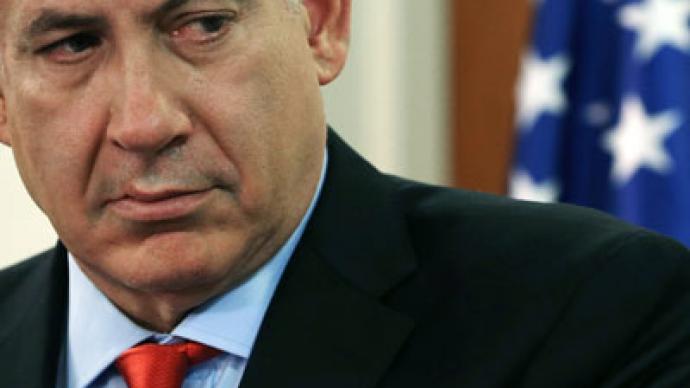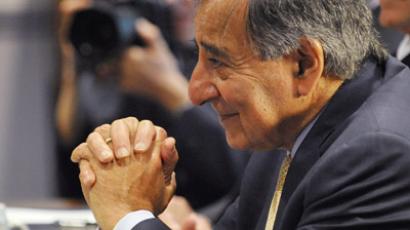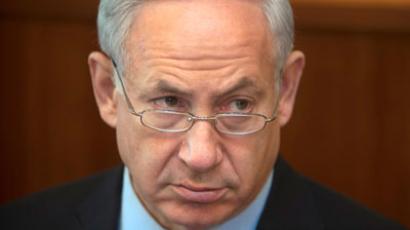Phony war: Is Netanyahu's tough talk on Iran just a front?

Israel’s threats that it could attack Iran at any time appear to be a tactical ploy, after a government insider revealed that no military plans against Tehran have been discussed by Israel's top ministers for “months.”
The information was leaked to news agency Reuters by a highly-placed official who has been briefed on all the meetings of the octet – an inner council of the top eight Israeli ministers, presided over by Prime Minister Benjamin Netanyahu."The octet hasn't held a proper discussion of Iran for months – since October, as far as I can recall," claims the insider."It's possible that, since then, Iran came up during other sessions, but I wouldn't count those as serious discussions. You can't make any concrete decisions or policy advances in an hour-long chat on the sidelines of a different agenda."The insider also confirmed rumors that the octet had factionalized, with hawkish Netanyahu held back by top military and security officials who are “entirely against” an Israel-led attack on Tehran’s nuclear program, believing the country does not have the necessary resources for a war with its much bigger rival."It is very, very difficult to see a situation where a prime minister will go against the advice not just of the former heads of Mossad and Shin Bet, but most of the military commanders," commented Uzi Rabi, director of Tel Aviv’s Moshe Dayan Centre for Middle Eastern Studies.The information is in sharp contrast to the belligerent rhetoric displayed by Netanyahu, who chided Washington’s softly-softly approach to Iran as he stood next to US Defense Secretary Leon Panetta during a press conference in Jerusalem earlier this week."Neither sanctions nor diplomacy have yet had any impact on Iran’s nuclear weapons program," boomed a visibly agitated Netanyahu, who at one point banged his fist on the lectern.Netanyahu also claimed that he would take responsibility for any attack on Iran, which Jerusalem believes is trying to acquire nuclear weapons. He claimed that he has, in fact, held bi-weekly meetings to discuss war-with-Iran scenarios.
A reluctant ally
There are several explanations for the discrepancy between the public sable-rattling, and the private caution in Jerusalem."The Iranians' math is off if they think they have open-ended immunity," Netanyahu said during the same press conference.Yet, the bombastic rhetoric could be intended as a message to the Iranian leadership, to create what the prime minister has called a “strong and credible threat” that will force Tehran to the negotiating table, where the West has placed heavy incentives for it. But only if the Islamic Republic gives up its dalliance with the atom.A second theory, widely circulated in the Israeli media, suggests that the war veteran prime minister is trying to rally the hawks, papering over the cracks in the cabinet and military by shouting out loudest – speaking as with one voice, when in fact, there are dozens of different views on the issue within Israel.But the most likely explanation seems to be that Israel is forcing the hand of its closest ally, the US. By saying that it will strike without consultation, it may force the US to intervene to avoid a bloody conflict in which Iran is likely to retaliate against Israel.In fact, during the press conference with Panetta, the US Defense Chief was forced into making strongly supportive comments after Netanyahu’s provocations, all the while looking uncomfortable at the US being cast as the soft one."We will not allow Iran to develop a nuclear weapon, period," insisted Panetta.Nonetheless, Washington may well call Israel’s bluff, partly because of the havoc any large military operation would cause to the prospects of President Barack Obama’s re-election in November’s presidential poll."It would not be healthy for Israeli-US relations to carry out such a significant attack that might influence the election. So my guess is they won't do it before early November, because it might embarrass the US administration," says Ephraim Kam, Deputy Director of the Institute for National Security Studies.What could happen after that is anybody's guess. While Obama has been the very model of caution, his Republican rival Mitt Romney has adopted a hard-line stance.“We must not delude ourselves into thinking that containment is an option,” he said during a recent visit to Israel, while his senior foreign policy aide promises Romney will not condemn any Israeli strike on Iranian facilities.
Igor Ogorodnev, RT














